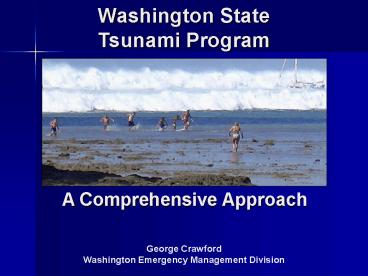Washington State PowerPoint PPT Presentation
1 / 18
Title: Washington State
1
Washington State Tsunami Program
A Comprehensive Approach
George Crawford Washington Emergency Management
Division
2
Hazard Identification and Vulnerability
Local tsunami evacuation maps developed based on
modeling, tsunami inundation maps and local oral
history.
3
Tsunami Construction Guidance
- No high ground
- Vertical evacuation
- Construction guidance
Nishiki Tower in Mie Prefecture,
Japan
4
Program Based on Comprehensive Approach
Earthquake Immediate (0 to 30 minutes) Organized Response 30 min to 12 hours
Cascadia mag 9 Education Training Education,Seismic data, Buoy data
Cascadia mag 8 (away from rupture) Education, Seismic data, Buoy data (rupture is like mag 9) Education, Seismic data, Buoy data
Distant (Alaska, Japan, other) Education, Buoy data Education, Buoy data
Nisqually-type or crustal Seismic data, Education Seismic data, Education
5
Tsunami Ready Community
- Public education cornerstone to success
- Risk communications -- key to how people will
respond - Exercise and drill response plans
- Train on the use of tsunami tools
- Social science must be part of the tsunami ready
process
6
Challenge
- Maintaining awareness and preparedness through
Public Education
7
Tsunami Ready Community
- Engaging business community save lives
- Tourist must be aware of tsunami issues and
evacuation procedures - Educate and train business on tsunami contingency
planning and train staff on what to do for a
tsunami
8
Tsunami Ready Community
- Community buy-in has to take place to have a
successful Tsunami Ready Program - Apply Growth Management principles to reduce
impact of a Tsunami on lives and infrastructure
9
Tsunami Ready Community
- Integrated on-shore communications infrastructure
must be in place to get the message to the public - Communication infrastructures to support alert
and notification system need to be in place to
make these system effective and reliable - An indoor alert and notification system for
public facilities, homes and businesses will
facilitate warning and evacuation - An outdoor alert and notification system for
tsunami communities to warn the public on beaches
or high traffic areas
10
Integrated on-shore communications infrastructure
11
Mount Octopus NOAA Weather Radio Transmitter Site
Project
12
NOAA Weather Radio
13
All Hazard Alert Broadcasting (AHAB) Radio
- Washington Emergency Management and Federal
Signal Partnership - Withstands gale-force winds and salt corrosion
with little to no maintenance - Battery operated. Charged by
- Electrical
- Wind
- Solar
Installed July 2, 2003 Ocean Shores
14
AHAB Radio
- Modulator siren 360 Degree
- An intense blue light activated to further
indicate that the area is under a hazardous
situation - Can be activated via
- National authorities
- State/local emergency management
- Other communication protocols
Installed Oct 30, 2003 Port of Port Townsend
15
(No Transcript)
16
Process for Developing Coverage Area
Coverage Area Map
- Evacuation Map
17
Results
- Provide rapid and effective warning to areas of
high risk to both man-made and natural hazards - Take advantage of several funding programs to
merge several technologies - Take advantage of existing communication
protocols - Take advantage of voice messaging technology and
local activation of AHAB Radio - 2004 National Earthquake Conference Award of
Excellence Category Response
Seattle AHAB Radio Project uses seismic
instruments, cameras, a weather station, and
chemical detectors
18
No Overnight Solutions Accept and Embrace
Generational Lessons
Become the change you want to see in the world

